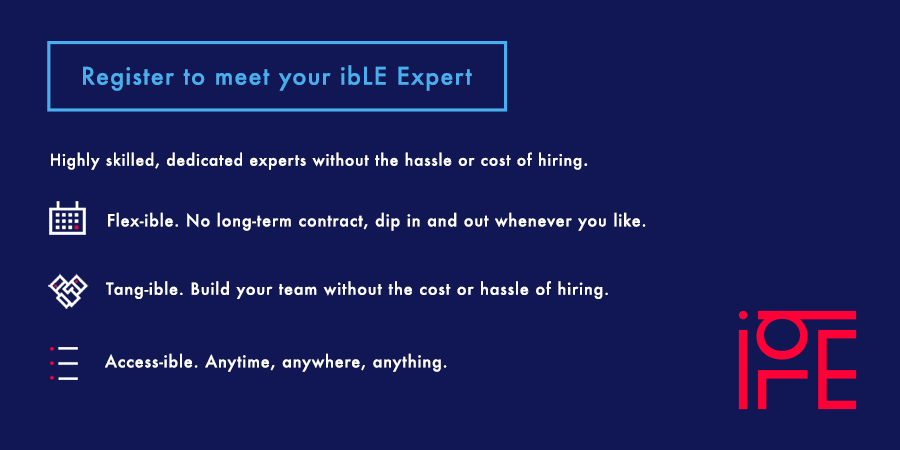Our Co-Founders, Emma and George, on the top things we look for in our ibLE experts.
Every now and then, our inbox gets an email from someone who’s looking for advice on how to become a virtual assistant, which always makes our day (it really is one of the best jobs in the world and if there’s ever a chance to talk about it, we will).
Together, we (George & Emma) have combined experience of 15 years either working as virtual assistants, or hiring virtual assistants for ibLE and other businesses. Over time, we’ve learned what it really takes to excel in this highly-skilled role and thought we’d take this chance to share our knowledge and help people who want to get a job as a VA.
So here goes.

Soft skills we look for in a good virtual assistant
Excellent time management
As an assistant, you’re not only managing your time, you’re managing your boss’s time too — tasks like calendar management, meetings and agendas will be on your to-do list every single day, so you need to be on top of time at all times.
Strong communication skills
This doesn’t mean just speaking regularly (although, that is one part of it). A good communicator is able to cut through the noise, ask the right questions and deliver precise, easy-to-understand messages to get sh*t done.
Attention to detail
That extra half-hour that allows your boss to have a break between meetings, or that final check of the presentation to catch a tiny spelling mistake — these details make all the difference.
Highly organised
As a virtual assistant, you make life feel 10x easier for your boss and that takes preparation. Any assistant knows that in order to do a good job of keeping their boss organised, they have to be organised themselves — it’s a bit like those safety videos on airplanes where they tell you to put an oxygen mask on yourself before helping others.
Resourceful
You might not always be able to get that thing signed off. You might not have all the software you need to do that task you’ve been given. Virtual assistants are self-starters and they always find a way.
Professional
Although you may be a personal assistant, there’s still a level of professionalism there. That means being responsible with confidential information, providing an excellent service and using the right tone.
A positive outlook
We’re going to level with you — the role of a virtual assistant comes with a lot of challenges, a lot of annoying situations and regular bumps in the road. But if you can see all that and still come away with a positive solution, then you’re going to go very far.

Soft skills we look for in a great virtual assistant
Growth mindset
You can either have a growth mindset or a fixed mindset.
People with a fixed mindset struggle with change and feel that they know everything they need to know. On the other hand, people with a growth mindset believe in constant change and improvement. Even when they are faced with challenges, they see them as an opportunity to grow. Virtual assistants need a growth mindset to keep up with ever-changing technological advances that impact their role and the ever-changing demands of supporting a business.
Service-focussed
As a virtual assistant, you are the CEO of your role. You’re fully responsible for the type of service you offer and the experience you create for those you work with. When things go wrong and it’s not your fault, you still see it as your responsibility to fix. There’s a common misconception that the role of a VA is to ‘pick up tasks’ when actually, it’s about providing an exceptional experience every day.
Respect for the role
To carry on from the last point, there are a lot of misconceptions about the role of virtual assistants — actually about all assistants. In their heads, people see the secretary stereotype, who is a cog in the machine of a much smarter, more important main character.
Well, we say down with the stereotypes. The role of assistants is often unrecognised, but not for us and not for all the brilliant virtual assistants out there. When we’re hiring a VA, we like to see the pride they have in this role and a strong understanding of just how important support teams are. A change of perception starts on the inside and if we all stand up for each other, we can make other people see that too.
Emotionally intelligent
Emotional intelligence (EQ) is the ability to understand, use, and manage your own emotions in positive ways to communicate effectively, empathise, overcome challenges, defuse conflict and translate the emotions of others. It’s a fricking big deal, especially for the role of a virtual assistant.
How do you react when you are met with certain emotions? Are you good at deciphering how people feel? These are skills that will help you throughout your career as a VA.
An active listener
Active listening is when you give someone your full attention and you let them know that they have your full attention. This is important for VAs as it a) makes your boss feel heard and b) prevents you from missing any important details.
Here’s how you do it:
- Making it all about them
- Let them set the agenda
- Don’t interrupt
- Maintain eye contact
- Don’t write pages of notes while they speak — there’s an app for that!
Good at failing
Yep, that’s right. Just like you can learn how to fall correctly, you can learn how to fail correctly too. Sometimes things go wrong because of something you did or didn’t do. You’re human, it happens. What matters is what you do next. On one hand, you could beat yourself up about it/ blame someone else, or on the other, you could assess the situation, apologise for your mistakes and put processes in place to prevent it from happening again.
“We’ instead of “me”
Even though virtual assistants are very self-sufficient and often work at home, you’re never an island. For us, it’s always really impressive to meet a VA who is a huge team player and is aware of the impact their role has on a wider group of people. From their boss, to the team and even clients, they play such an important part in a bigger purpose.

There’s one thing that all of these soft skills have in common and it’s that they build trust. As a virtual assistant, you’re not sitting right next to your boss every day and so, that trust is your currency. If you can look at this list and show examples of where you’ve applied these soft skills in a job application for a VA, we think you’ll do just great.
Want to apply to become a ibLE expert? Head here.


One comment
Comments are closed.